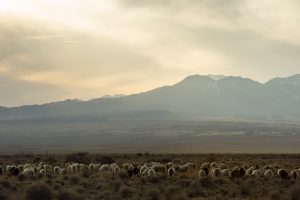Kazakh President Kassym-Jomart Tokayev has weighed in on the latest iteration of an old canard: That Kazakhstan, before the Soviet Union, was nothing close to a state. In a state-run newspaper this week, days before the country’s parliamentary elections, Tokayev wrote under the headline “Independence — A Most Precious Thing” that “nobody from outside gave Kazakhs this large territory as a gift.”
In December, a pair of Russian politicians stirred the proverbial pot. As RFE/RL’s Bruce Pannier explained last month, the incident began with December 10 comments from Vyacheslav Nikonov, a Duma deputy, on a TV program dedicated to the signing of the Belovezha Accords on December 8, 1991. The accords effectively dissolved the Soviet Union, replacing it with the Commonwealth of Independent States. (Fun fact: Kazakhstan was the last of the USSR’s republics to declare independence; it did so on December 16, 1991).
Nikonov commented that when the Soviet Union was created in 1917, “Kazakhstan simply did not exist as a country, its northern territories were basically uninhabited,” and that areas “further down south [in present-day Kazakhstan], most of the territories were basically given as a gift to [the Kazakhs] by the Soviet Union, by Russia.”
On December 12, the Kazakh Ministry of Foreign Affairs summoned the Russian charge d’affaires to a meeting with Deputy Foreign Minister Marat Syzdykov. Press readouts say that Syzdykov “expressed bewilderment” about Nikonov’s comments, handed over a note, and urged the Russian side to take measures to prevent such statements that could “cause serious damage” to bilateral relations.
The next day another Duma deputy, Yevgeny Fedorov, on a YouTube program agreed with Nikonov’s comments. Fedorov said Kazakhstan was a “big gift from Russia.”
“It’s one thing that a kind Russian person gave you a gift and you appreciate it and are friends with him. But another thing is if you spit on him, as in this case the Kazakh Foreign Ministry did [on Russia],” he added, referencing the Kazakh ministry’s summoning of the charge d’affaires.
This particular pot was most dramatically boiled by President Vladimir Putin in 2014 when he remarked that “the Kazakhs never had any statehood” before the collapse of the Soviet union in 1991. At the time he was also trying to heap praise on Kazakh President Nursultan Nazarbayev, whom he credited with creating “a state in a territory that had never had a state before.” The backhanded compliment, aired amid the ongoing Ukraine crisis, stung Kazakh pride and worried some that Russia might disrespect Kazakhstan’s sovereignty in a similar vein.
As for the latest comments, RFE/RL reported that “Some Kazakh opposition activists have claimed the Russian lawmakers made the remarks to boost support for the ruling Nur Otan party’s national unity platform ahead of parliamentary elections scheduled for January 10.” Whether that’s true or not is probably unknowable, but whether Nikonov and Fedorov are in on such a scheme or not “unity” is certainly a core political theme in Kazakhstan.
Unity has been one of the central themes of Kazakhstan’s post-1991 politics. This is a thread woven across the states of Central Asia, which after the collapse of the Soviet Union moved in different but parallel ways to establish sovereignty and control over their suddenly separately independent territories and peoples. A strict definition of unity is also a useful excuse for limiting liberties by vilifying those seen as acting against the interests of unity — whether actual separatists or just nascent political opposition.
It’s no surprise that in his article, Tokayev underscored that political reform is a long process (critics would say the pace is glacial): “We must do this carefully and gradually, without shaking the foundations of the country or undermining its prosperity and unity.”
There is, of course, as Pannier outlined last month, plenty of valid suspicion about Russian motives, particularly after the annexation of Crimea, enflamed further by a series of nationalists from Russia who have suggested seizing Kazakh territory or otherwise disparaged the state’s independence. Land is a consistently sensitive and explosive issue in Kazakhstan, as demonstrated by the waves of protests in 2016 touched off by rumors that reforms in the land code were simply cover for selling off Kazakh land to the Chinese.
Embedded also in this mix are ignorant, racist, and (dare I say it) colonial notions about the Kazakh steppe as some big, blank, empty canvas, and its people as wandering aimlessly across a barren landscape until the civilizing forces of Imperial Russia, and later the Soviet Union, arrived with modernity in hand. None of that is so simple or so true, any knowledgeable modern historian will tell you, but such beliefs are baked into stereotypes about not just Kazakhstan, but Central Asia more broadly. (And similar constructs bedevil various communities around the world — such as the American myth that the North American continent was essentially empty, untouched, and uncivilized when the pilgrims landed).
But at the end of each episode of traded insults and diplomatic notes over Kazakh sovereignty one thing is clear: No matter how offensive some find such comments, Kazakh-Russian bilateral relations remain strong and on course. This makes observing the dance of offense and pride — a swirl of politics, ignorance, and nationalism — all the more interesting.

































